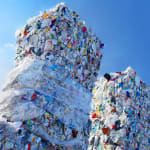
Climate protection and the circular economy must not be put on the back burner due to the ongoing coronavirus crisis. A point re-emphasized by Michael Wiener, CEO of Der Grüne Punkt: “This would mean ignoring the economic opportunities offered by the circular economy. The coronavirus crisis, in particular, shows that Europe must be able to operate independently up to a certain degree. The circular economy offers an opportunity to render Europe more autonomous in terms of raw material procurement, and to keep within the EU or fetch back added value that’s essential for reconstruction.”
Michael Wiener is thus supporting the remarks of Peter Kurth, the President of the Federation of the German Waste, Water and Raw Materials Management Industry (BDE), which are quoted today in the Neue Osnabrücker Zeitung newspaper: “Anyone who believes that because of the coronavirus climate protection and an improved circular economy are dispensable, is mistaken. The issue of an ecological modernization of our economy remains on the agenda.” Which is why the organization is addressing an urgent appeal to Europe’s top politicians not to water down the Green Deal. “Now is the time to show that climate protection in Europe is not a fair-weather affair.”
“This applies all the more to plastic, where we urgently need to shift from a linear to a circular economy,” emphasizes Michael Wiener. “Plastic is still being made predominantly from oil, used once and then disposed of. This entails numerous very significant problems.” Some of these was recently described by the European Academies’ Science Advisory Council of the (EASAC) in its report on the necessity of a circular economy for plastic:
- Plastic particles are meanwhile ubiquitous in the natural environment and in all organisms, with a concomitant risk of enriching themselves in the food chain.
- The linear economy for plastic is leading to an ever-increasing consumption of resources, because demand is rising.
- It is not compatible with global sustainability goals like responsible production and responsible consumption, or climate protection.
- Low recycling quotas and major leakages of plastic waste into the natural environment are in contravention of in international legislation on the treatment of waste and the protection of the seas.
- Exports of plastic waste from rich countries to poorer ones lead to major environmental pollution there, and are deleterious to the population’s health.
“The scientists at EASAC make it clear that all these problems can only be solved with the aid of a fully functional circular economy for plastic,” to quote Michael Wiener. “This is not a task we can put into cold storage simply because it’s inconvenient.“ Year after year, it is estimated, ten million tons of plastic waste end up in the seas worldwide. On the other hand, the proportion of recyclates, meaning recycled plastics, in Europe’s total plastic production output is a mere six percent. “We’re using increasing quantities of oil for producing plastics in Europe, concomitantly releasing large quantities of climate-harmful gases, instead of exploiting used plastic as what it is: an enormous source of raw materials,” says a critical Michael Wiener.
Source: Der Grüne Punkt Group


